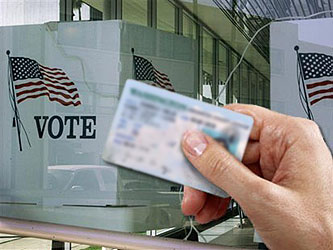Earlier this year I wrote about “Defunding 2.0,” a modern trio of Republican efforts to defund the left and impede people from voting for Democrats. By far the most important part of this effort is voter ID laws designed to make it harder for  left-leaning constituencies (students, minorities, the poor) to vote. We’re finally starting to see the mainstream media pay some attention to this lately, and today David Savage puts it front and center in the LA Times. His poster child is a recently passed law in Florida:
left-leaning constituencies (students, minorities, the poor) to vote. We’re finally starting to see the mainstream media pay some attention to this lately, and today David Savage puts it front and center in the LA Times. His poster child is a recently passed law in Florida:
Early voting was reduced from two weeks to one week. Voting on the Sunday before election day was eliminated. College students face new hurdles if they want to vote away from home. And those who register new voters face the threat of fines for procedural errors, prompting the nonpartisan League of Women Voters to suspend voter registration drives and accuse the Legislature of “reverting to Jim Crow-like tactics.”
What is happening in Florida is part of a national trend, as election law has become a fierce partisan battleground. In states where Republicans have taken majority control, they have tightened rules for registering new voters, reduced the time for casting ballots and required voters to show photo identification at the polls. The new restrictions were usually adopted on party-line votes and signed by Republican governors.
….Republican lawmakers say Democrats and minority groups are overreacting. “We’re going to have a very tight election here next year, and we need to protect the integrity of the election,” said Rep. Dennis Baxley, a Republican from Ocala. “When we looked around, we saw a need for some tightening.”
I think we all know exactly what “integrity of the election” means to Rep. Baxley. After all, Florida has only suffered from two types of serious voter fraud in the past decade. The first is absentee ballot fraud, which Florida’s bill does nothing to address because absentee voters tend to be upscale and Republican. The second is widespread database errors in 2000 that prevented people from voting. The Florida bill also does nothing about that, because those problems mainly affected Democratic-leaning voters.
So: Florida’s bill addresses a problem that’s essentially nonexistent, and does so in a way that will likely suppress left-leaning votes. “It could easily decide the outcome,” says election law expert Rick Hasen. Conversely, it does nothing to tighten up on areas that actually have caused problems in the past, but that mostly favored right-leaning candidates.
I report, you decide. What do you think the real purpose of Florida’s shiny new voter ID law is?













